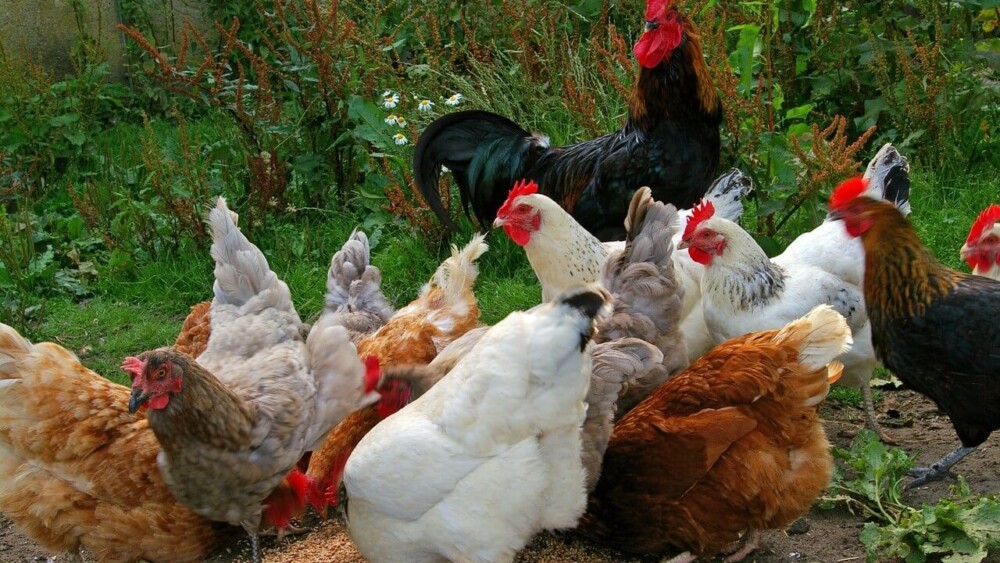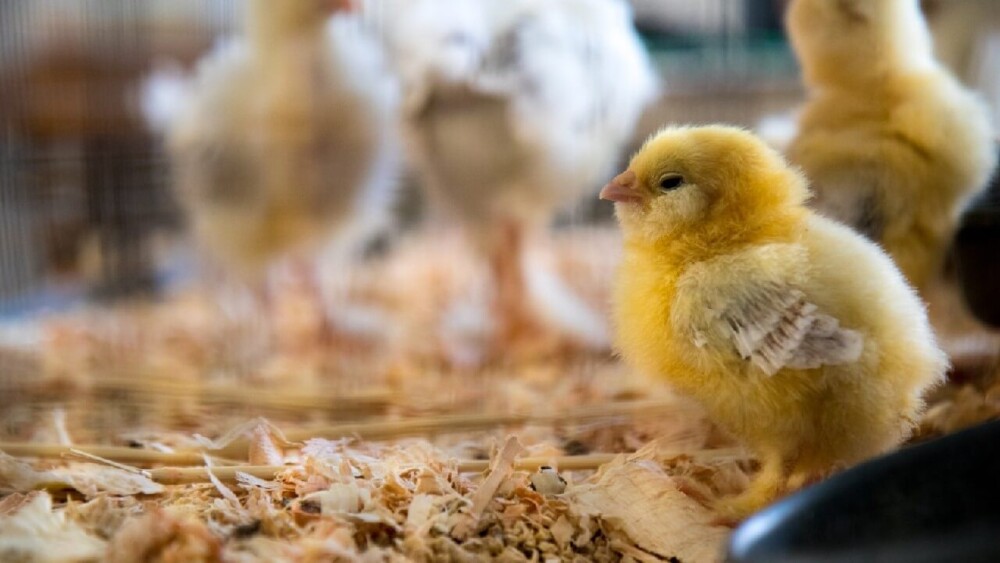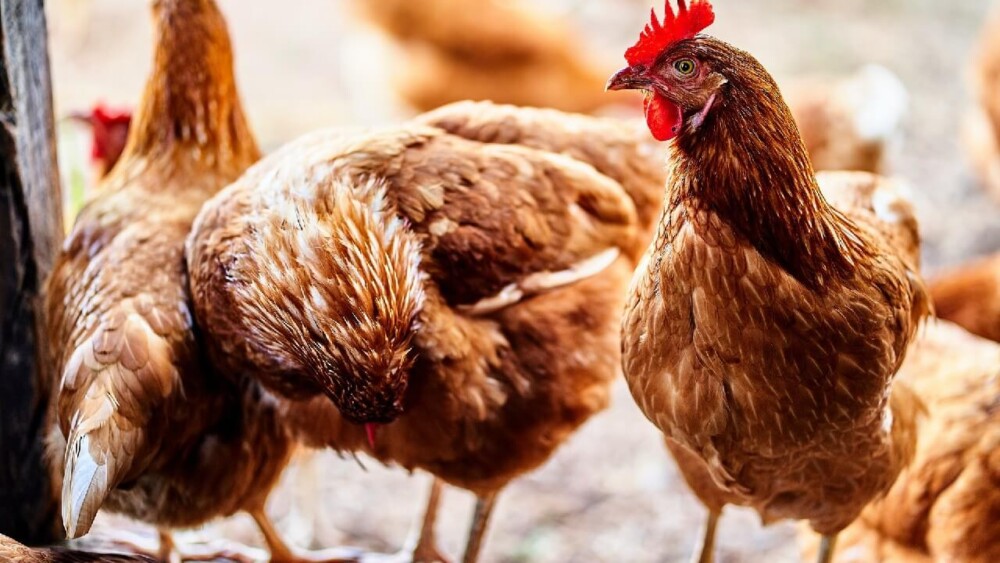Maintaining good health in your flock is extremely important whether you have a backyard flock or a commercial farm. Ensuring the health of your flock includes administering the correct vaccinations at the right time of year.
What vaccinations do chickens need? Most chicken owners apply three vaccinations that protect flocks from the most common diseases: MDV, Newcastle-Bronchitis (NB), and Avian Encephalomyelitis-FowlPox (AEF). MDV protects against Marek’s disease. NB and AEF vaccinations are combination vaccines that protect against multiple diseases.
These three vaccinations give chickens a wide coverage of health protection regardless of the area they live in. Other chicken vaccinations include Avian Influenza Vaccination, RNA, Laryngotracheitis vaccination, Avian Metapneumovirus, and IBD Vaccination.
Chicken Vaccination Schedule
| Disease the Vaccine is For | How It’s Given | What Age It’s Given At |
| Marek’s Disease | Injection under the skin | 1 day of age |
| Newcastle / Infectious Bronchitis | Orally in drinking water | 14-21 days of age Every 60-90 days afterward |
| Fowlpox / Encephalomyelitis | Injection in the wing web | 10-12 weeks of age |
| Infectious Bursal Disease | Orally in drinking water | 14-21 days of age Again at 16-18 weeks of age |
| Laryngotracheitis | Via eye drops | 10-12 weeks of age |
Marek’s Disease
Marek’s is probably one of the most talked-about diseases when it comes to poultry. It causes tumors, body paralysis, and blindness in young chickens. It’s normally seen in pullets under 6 months of age.
Birds can recover from Marek’s Disease. But, they remain carriers of the illness for the rest of their lives. This means they can pass the disease to other unvaccinated birds.
Vaccinations for Marek’s Disease are given to one-day-old chicks. The injection is done under the skin of the neck or breast. It’s simple enough that you can administer it to your flock. If you purchased chicks from a commercial hatchery, a Marek’s vaccination was included or offered when you placed the order.
Newcastle Disease and Infectious Bronchitis
Newcastle and Infectious Bronchitis diseases cause respiratory issues in flocks. Signs include swollen eyes, gasping for breath, coughing, nasal discharge, and swelling of the throat muscles. In severe cases, infected birds may exhibit body tremors or muscle paralysis. This can result in sudden death if heart or diaphragm muscles are affected.
Other symptoms include severe dehydration, diarrhea, and other gastrointestinal distress. Chickens will have difficulty eating and digesting.
Some chickens won’t recover from the dehydration and malnutrition caused by the illness. They may become lethargic and easy prey for predators or bullying by the flock.
Vaccinations for Newcastle disease include vaccination for Infectious Bronchitis. It’s often given as eye or nasal drops or in the drinking water. It is usually given as a preventative measure before chicks are a month old. It’s repeated every 3 months for long-term protection.
Fowlpox and Avian Encephalomyelitis
The risk of your flock catching Fowlpox or Avian Encephalomyelitis rises when mosquitoes are near. Mosquitoes are the number one transmitter of these diseases. Controlling them is the first step in reducing the risk to your flock.
Both Fowlpox and Avian Encephalomyelitis show as discolored blisters on the chicken’s comb, wattles, legs, and vent. Most healthy birds recover from Fowlpox on their own. It can leave permanent scars. Avian Encephalomyelitis can also include signs of leg weakness and paralysis.
The vaccination for Fowlpox includes vaccination for Avian Encephalomyelitis. It is a live vaccination and is given to birds under 3 months.

Infectious Bursal Disease
Infectious Bursal Disease is sometimes called Gumboro disease. It affects chickens under 4 months. It’s extremely contagious in both backyard and commercial flocks. Prevention is the best course of action.
Infectious Bursal Disease is hard to diagnose by watching the chickens. That’s because most of the damage is internal. Affected chickens will have internal bleeding and swelling around the heart and chest cavity. It primarily affects young birds. Deaths can happen quickly due to their underdeveloped immune system.
There is no treatment for sick chickens. But, vaccinations can minimize or prevent infection. They can also reduce the internal damage an affected chicken receives. Vaccinations should be given before the chickens turn 21 days of age and provided once more before the chickens reach laying age.
Laryngotracheitis Respiratory Infection
Laryngotracheitis Respiratory Infection is extremely contagious. It’s one of the more aggressive upper respiratory illnesses poultry can contract. It’s often found among broiler chickens in enclosed buildings. This disease is found worldwide and affects large and small flocks.
Once a single bird shows signs of the disease, it quickly spreads to other chickens. It can also affect pheasants and turkeys. Signs of a Laryngotracheitis infection include gasping for breath, swollen face, watery eyes, and nasal discharge.
If left untreated, mortality rates can reach 70% or more. With treatment, full recovery can happen in 10 days. Vaccinations don’t prevent infection. They are used to stop symptoms of the illness. The vaccination can be given in the eye with liquid drops when the chickens are 10-12 weeks of age.
Avian Rhinotracheitis
Also known as Avian Pneumovirus or APV, this disease is mostly known to affect turkeys. However, breeding-age chickens can also contract the virus. In chickens, it is commonly referred to as “swollen head syndrome.” That’s because one of the symptoms is a swollen head.
Other symptoms include difficulty breathing, nasal discharge, and upper respiratory congestion. Mortality rates are normally low among affected flocks. But, egg production often halts until the hens recover.
Vaccinations are mostly used for commercial flocks. They are rarely used for backyard chickens. It’s given at the point-of-lay, just before moving a commercial-sized flock into the breeder buildings. APV is generally rare for backyard chickens, and maintaining good coop hygiene can help prevent risk factors and potential outbreaks.
Avian Influenza (Bird Flu)
Wild birds and migratory waterfowl commonly carry Avian Influenza. It’s a highly contagious and often fatal disease that can affect domestic chickens worldwide. The Center for Disease Control (CDC) has found that more than 100 species of wild birds carry the Avian Influenza virus. There are multiple strains of the virus.
Some strains are more dangerous than others. A few strains can affect humans, horses, and dogs. Early signs include purple discoloration of the chicken’s face, comb, and wattles. Other signs include gasping for breath, swelling of the neck and chest, weakness, and rapid death among previously healthy birds.
Domestic chicken flocks commonly in contact with migratory waterfowl or wild songbirds are at a much higher risk than those kept confined.
Vaccinations can be given as an injection to young birds as a way to prevent bird flu in your flock. Most chicken owners don’t vaccinate for bird flu unless their area has a history of it or their chickens are in contact with wild birds.
Vaccinating Free-Range Chickens
Administering a dose to free-range chickens can be difficult. Some vaccinations are administered orally or with liquid drops. In this case, one of the easiest ways to ensure your entire flock is vaccinated is through drinking water administration.
Withhold water from your flock for a few hours to ensure they are thirsty. Then, add the vaccination to their water source according to the recommended dosage. Let your birds drink normally. They will be thirsty and should quickly drink their water and vaccinate with no mess or stress.
Clean out the entire watering system two hours later. This gives the flock plenty of time to drink and ensures the vaccine was given at the optimal temperature. If it sits in the watering system for more than two hours, it will become inactive.
For injection vaccines, catch your free-range chickens during the evening when they roost. Chickens have poor eyesight in the darkness and will usually remain calm when handled at night. Additionally, you can catch, vaccinate and return them to their roost in a short amount of time, limiting the amount of stress they receive from the process.
Vaccinating Caged or Enclosed Chickens
Commercial poultry farms normally keep large numbers of birds caged. As with free-range chickens, water-based vaccinations are the easiest way. Most commercial farms use drip systems for their watering methods, allowing the birds to peck at a silver tip and receive water droplets as needed.
An additional method includes misting the area with a fine spray of the vaccine in water or saline solution mixture. This can be done with overhead misting systems or caretakers using pressurized backpack misters like weed sprays. Since some vaccines can be given orally or by respiratory inhalation, the mist system is a perfect choice for this.
Chickens preen their feathers when they get wet, causing some of the vaccination to be ingested orally. Additionally, this spray has an extensive range of coverage over the entire population of chickens, ensuring everyone gets at least some of the vaccine.
Larger farms that need to vaccinate birds by injection normally have a process in place that involves multiple steps and multiple people. Some will be responsible for catching and moving the birds, others will be responsible for the actual injection process, and more still will be involved in placing the birds back into a cage or broiler house.

Understanding Requirements For Commercial Poultry Farms
Most areas don’t have laws requiring chicken vaccinations. But, a simple vaccination schedule can help your birds live long and healthy lives. It also depends on local risk factors. If Newcastle Disease is common in your area, you may choose to vaccinate against it.
If you plan on selling eggs, meat, or chicks, vaccinations may be required, depending on your area. This is especially true if you register for National Poultry Improvement Plan (NPIP) status. If you sell on a commercial scale in the U.S, you’ll have additional vaccinations.
The United States Food & Drug Administration (FDA) has its own rules for vaccination requirements in commercial flocks. These requirements protect your flock from preventable diseases and can protect other flocks and some wild avian species as well.
NPIP Certification and Hatchery Vaccination Requirements
The NPIP is a testing and certification program that has been around since the 1930s. It was created by the U.S. Department of Agriculture (USDA) to monitor the spread of Pullorum-Typhoid (PT) around the country. At one time, PT had a greater than 80% fatality rate in chicks from commercial flocks. It is highly contagious and spreads incredibly fast between birds and flocks.
Having your flock tested for NPIP certification is voluntary in the United States. However, if you are selling on a commercial basis, having NPIP certification does show your potential customers that you give an extra level of attention to the health of your birds.
Preventing Illness Through Good Chicken Husbandry And BioSecurity
There is a wide range of possible diseases that chickens can contract. For the most part, poultry is hardy and disease-free animals. Problems arise when birds are kept in confined spaces or live in unhygienic conditions. Diseases spread quickly and easily from one bird to another through droppings, the air, or a water source.
Practicing good biosecurity will keep your flock healthier. It can be as simple as quarantining new arrivals to the farm. Some chicken raisers limit visitor access or maintain entirely closed flocks.
In many areas, good biosecurity means the difference between life and death. Avian Influenza can wipe out thousands of birds in days. All it takes is a single infected bird.
Wild birds can also transmit avian Influenza and migratory waterfowl, so limiting their access to your farm helps. Using screens around your broiler or egg layer buildings prevents small birds from accessing the building for nesting purposes. Build away from ponds and other waterfowl-attracting water sources.
Quarantine new birds and limit new arrivals for smaller farms. If you take birds to poultry shows, quarantine them for a week or longer when returning home.
If you do choose to bring in new birds, isolate them. Quarantine in a different building or different part of the farm can last as long as 30 days to ensure absolutely no new pathogens, illnesses, or parasites are brought into your established flock.
Biosecurity can be a beneficial way to prevent diseases from cropping up in your flock.
Frequently Asked Questions
Where Do You Buy Chicken Vaccinations? Some vaccinations are only purchasable with a prescription from your veterinarian. Others, you can find at some farm supply stores. If you can still find a source for vaccines in your area, contacting a local chicken breeder or commercial hatchery might help point you in the right direction.
How Should Vaccinations Be Stored? Each vaccination bottle will have information on the label for proper storage. Most will need to be refrigerated. Always be sure to read the label and ensure you are storing your vaccinations properly.
Proper storage methods ensure the vaccine lasts for future use. It also helps prevent vaccination failure. Improperly stored vaccines separate in the bottle or deactivated if kept too cold or too warm. Using an improperly stored vaccine might not give your chickens the health protection they need.
Can Egg-Laying or Meat Chickens Be Vaccinated Safely? There are usually no restrictions when it comes to eating the eggs or meat from a vaccinated bird. Antibiotics can have a 60-day wait before it is safe to eat the eggs or meat from a treated bird.
Additionally, most vaccinations are done on day-old or very young birds, so there is absolutely no risk to consider by the time the chicken is old enough to be laying or processed.
Live vaccinations use live cultures of the virus or bacteria. This gives the chicken’s immune system a weakened threat to develop antibodies for. Since the virus and bacteria are technically alive, some chickens can show minor signs of the disease.
Can Unvaccinated Chickens Be Around Vaccinated Chickens? There are no problems in mixing vaccinated chickens with unvaccinated chickens. But there is speculation and debate among the chicken community on the potential risks of doing so.
The Marek’s Disease vaccination prevents the disease from affecting vaccinated birds. But, they can still carry and spread Marek’s to other birds even while symptomless.
Conclusion
In general, poultry can be very hardy and healthy animals to have on your farm. They can be delightful and also lucrative no matter the scale you choose to keep them on. As long as you keep your flock in hygienic conditions and provide them with proper food, clean water, and the right vaccinations, you will be enjoying your chickens for a long time to come!
References
My Favorite Chicken and Duck Supplies
This list contains affiliate products. Affiliate products do not cost more but helps to support BestFarmAnimals and our goal to provide farm animal owners with accurate and helpful information.
Manna Pro Oyster Shell keeps eggs strong. Before I gave my chickens oyster shell, I had the oddest eggs, many with weak and irregular shells. Now, I don’t have an issue.
Layer Feed by Manna Pro. I like pellets rather than crumbles as my chickens eat them better and less gets wasted or scavenged by rodents. A good layer feed makes the difference in hens laying many more eggs.
My chickens love this mealworm treat, which gives added protein, something that’s great during molting and winter months.
There are many ways to feed and water your chickens. I like this food and water setup the best because it reduces waste, saves me time feeding and watering, and keeps the food fresh longer. Except, in the winter, I use a heated waterer. The only problem is the heated waterers need to be replaced every few years.
I love this chicken veggie hanger. It makes it easy to give your chickens produce from the garden and keep them occupied in the winter with a fresh head of lettuce.
These chicken toys are a hoot! They will help curb bullying and keep your chickens active, especially in the winter when hens tend to get more lethargic.

